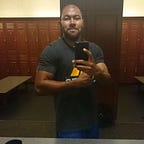The Twelfth Day
What if it were possible to cure your biggest flaw?
What if you had the power to change the one thing you didn’t like about yourself the most?
You’d do it, wouldn’t you? Without hesitation.
Humanity is a tricky thing. Our humanity reminds us that we aren’t like other things — like inanimate objects, for example, or animals. We can separate ourselves from them and identify each other simply because one human knows what another human is capable of doing.
Because we are human, we don’t get to make as many excuses, though. When animals are violent, we chalk that up to animal behavior. Humans, however, have logic. “Human nature” isn’t supposed to be as primitive or brutal.
That applies to our flaws as well as our good parts.
Some of us are disabled. We may be forced to move around in a wheelchair. Or we may be missing an appendage. Or we might have a hearing defect. Or we might be mute.
Some of us suffer from chronic ailments. We’ve learned to live with HIV. We’ve learned to adapt to our ADHD. We fight back against Crohn’s disease.
Still others have physical flaws. We won’t call them deformities because that’s not what they are. Maybe you have a scar. Maybe something was removed. Maybe something is jarringly visible on you to where people struggle to not stare.
But what if you had the power to get rid of it? What if, whatever it is that “ails” you, you had the power to make it disappear?
The problem is, if you’ve learned to live with your flaws, to cast them aside is to also cast aside everything else that made you, you. What if that was the cost?
You got burned and scarred for life from the burns. You can’t get rid of those scars. But despite you having those scars, you still were successful in life. You still did the things you set out to accomplish. People didn’t love you in spite of your scars — they loved you BECAUSE of you. Because you worked hard to be noticed beyond those scars.
You don’t have your legs, and you haven’t since you lost them in an accident. You struggled to get out of bed until you had no choice but to because you still had a life left to live. You learned to move with a wheelchair. You got help but ultimately became self-sufficient in order to get around and conduct business. You were not only successful but you accomplished accolades. You made it work until it was no longer work — it was just your life.
Imagine you could get rid of your biggest flaw… at the risk of getting rid of everything else that made you who you are RIGHT NOW. Would you pay that cost? COULD you pay that cost?
I wonder about that every day.
As someone who identifies as deaf, but has not exactly carried myself like a deaf person, I have always wondered if there was a cure, would I accept it? If something came along tomorrow that would allow me to hear like everyone else does, to not stand out in a crowd with my hearing aid, to not be so obviously different — would I take it? In a heartbeat.
Maybe it would take two heartbeats. Or ten.
Most reasonable people would not see being mostly deaf as a “flaw.” I have, however, always thought of it as something that could be fixed. And as someone who by nature always wants to fix things or salvage things, it’s always humbling to have to accept that I can’t “fix” my own hearing.
But maybe I’m who I am because I don’t have my hearing. Maybe I work harder in some cases — and admittedly, not so much in others — because I know what my disadvantage is. The trick with flaws is learning to look past what’s in your head. It’s always going to be obvious to you because you’re the person who has to live with it.
And if you decide to get married or take on a partner, then someone else has to live with you living with it. That makes it scarier. How, exactly, do you trust that what you have won’t be counted against you? Will they always measure your flaw against you? Worst still, did they take pity on you because of it?
You will never know the answer to these questions. And even if you asked for an answer, you’ll never know whether the person was truthful about it. Your flaws are what make you human, but your flaws don’t have to be the basis of your humanity. If a flaw is your burden to carry, it’s because God felt you were worthy to carry it — or that God didn’t expect you to see it as a burden. Easier said than done, I know.
But… if you could choose to undo it, at the cost of losing everything that you taught yourself and losing the person you became… would you? Would I?
My answer changes every day.
Maybe it’s progress at least that, where before I’d have said “in a heartbeat”… these days, I really have to think about it.
